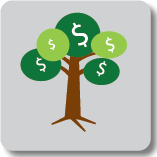Retirement in Professional Sports
Former boxer, two-time World Heavy Weight champion, George Foreman has earned over $200 million selling his famous George Foreman grills. He has made significantly more money endorsing products in his retirement years than during his boxing career.
I once had a conversation with a friend of mine who worked in the NBA office about retired players. He talked about how it’s not uncommon for the NBA to get calls from former players requesting to either take money out of their 401k plan or get their pension earlier than what the league requires to receive a pension. At the time, it was strange because all of the names he mentioned had signed multi-million dollar contracts and many were in their mid-to late 30’s and not too far from their retirement from basketball.
Nonetheless, all former athletes that ‘retire’ are retiring from their athletic career. Most athletes who ‘retire’ are in their 20’s and 30’s. Some are lucky enough to play into their 40’s. If a player hasn’t signed a ‘Retirement Contract’ (from Chapter 2: The Athlete Life Cycle) they will to have to find some other form of employment after their athletic career is over.
Most leagues offer a retirement plan for its players. This means that once a player reaches a specific age they will receive a certain amount of money per month and medical care for the rest of their lives. Retirement plans vary from player to player and league to league. The retirement amount is calculated based on the size of a player’s contract and number of years played.
Former heavyweight boxing champ George Foreman competed in a sport that was not affiliated with a league with a pension. So for athletes like Foreman it’s crucial to formulate a retirement plan. Luckily for Foreman, he should not have to worry about his income stream in retirement because of the tremendous success of his George Foreman grills. To date the grills have brought in more than $200 million!
Retirement in Life
“By failing to prepare, you are preparing to fail.”
— Benjamin Franklin
When a person retires they simply stop working at a place of business. People typically retire after a period of time, usually 25 to 30 years, of service at a company or organization. This means that most people will retire anywhere from age 50 to 70. In some cases, whether by choice or necessity, individuals work into their 80’s and beyond.
The main factor to remember is that in retirement you are no longer earning a paycheck. You are expected to live off of either your savings or retirement income. Your retirement income may come from a pension or a 401k plan.
A pension affords a certain amount of money per month for the rest of an individual’s life and is usually provided by public employers like a city/county (school district), state (Department of Motor Vehicles), or federal agency (FBI), to name a few. Most car companies offer pensions also.
A 401k (or similar plan) is different in that it allows employees to contribute money to a savings fund during the course of their employment. In some cases employers will contribute to the plan as well. Over time this can amount to a significant amount of money. The only difference is that a 401k can run out over time. So if a person retires at age 50, his/her 401k needs to last until they pass away. In America the average life expectancy is 76 for men and 81 for women. So that income would have to last at least 25 to 35 years. Some prudent people retire with a pension, 401k, and significant savings.
The Professional Golfer’s Association of America (PGA) has the most generous pension plan in all of professional sports. Many of the top players will have well over $10 million in their pension accounts by the time they retire. A player like Tiger Woods, who’s been playing professional golf since the age of 19, could have around $200 million in his pension account when he reaches retirement age. It’s good to be a golfer!

The Athlete's Handbook: Life Skills Coaching Tips for the Game of Life | Copyright 2018 David Hollaway | All rights reserved | Press Kit | Academy | Contact




